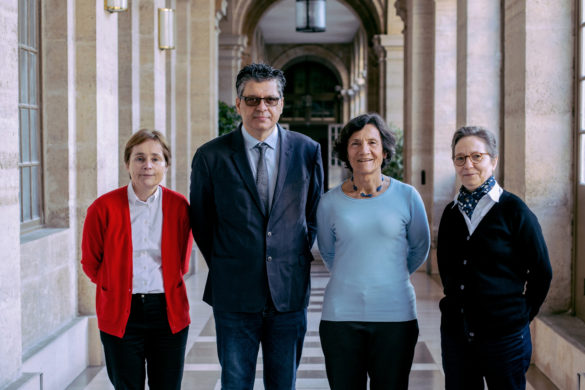Professor Tissa Wijeratne and Professor Wolfgang Grisold have teamed up on an expert article for the World Brain Day “Move together to End Parkinson’s Disease”.
Professor Tissa Wijeratne MD FRCP(Edin) FRCP (London)FAHA FAAN FRACP
Director, Department of Neurology, Western Health & AIMSS, Melbourne Medical School, Sunshine Hospital, St Albans, Victoria,3021, Australia
Chair, World Brain Day, World Federation of Neurology
Professor Wolfgang Grisold MD (Vienna, Austria) – Secretary-General, WFN, Vienna, Austria
The burden of Parkinson’s Disease (PD) has more than doubled over twenty-six years from 1990 to 2016 (1). This was from 2.5 million patients (95% uncertainty interval 2.0-3.0) in 1990 to 6.1 million patients (95% uncertainty interval 5.0-7.3) in 2016. The rate doubling is alarming to the extent that PD in itself is behaving as a pandemic on its own. It is worth remembering again that neurological disorders (including PD) are the leading cause of disability worldwide (2). The painful truth is the ongoing lack of resources and research funding as well as support for neurology globally, as vividly reported by the World Health Organisation Neurology Atlas published in 2017. It is a good reminder for us to be the best advocates to address this issue now (3-6).
Our primary focus is for the EAN pages readers to join us in this ambitious advocacy effort for the following five key messages:
1. PREVALENCE
Parkinson’s disease is a chronic neurodegenerative brain disease that affects more than 7 million people of all ages worldwide, and its prevalence continues to increase.
2. DISABILITY
Parkinson’s disease is a whole-body disease that affects movement and all aspects of brain function, with symptoms worsening over time.
3. STANDARD OF CARE
Access to quality neurological care, life-changing treatments and essential medications is unavailable in many parts of the world.
4. RESEARCH
Additional resources are needed to help unlock the cause, onset, progression, and treatment of this disease across all ages.
5. ADVOCACY
Let us work together to diagnose earlier, treat more effectively, and reduce the Burden of Disease, which has doubled in the last 30 years. We are engaged to improve the lives of both those living with Parkinson’s Disease and their caregivers.
On the WBD, the WFN works jointly with the International Parkinson’s and Movement Disorders Society (MDS) and experts affiliated with various advocacy organizations throughout the world, especially Europe and North America.
The World Brain Day (WBD) is a regular yearly activity of the World Federation of Neurology for improving awareness and advocacy related to neurological diseases. It is 22 July every year commemorating the establishment of the WFN in 1957. The WFN chooses a topic and promotes the WBD, by providing material, press support to their member states. For several topics, the WFN has collaborated with other international organizations.
The previous topics of the WBD were: 2014 – Our brains our future, 2015 – Epilepsy (partnering with ILAE), 2016 – Health and the Ageing Population, 2017 – Stroke is a brain attack – prevent it and treat it (partnering with WSO), 2018 – Clean air for brain health and 2019 with the WFN environmental special interest group (SIG) Migraine, the painful truth (partnering with IHS, 2019 Webinar can be accessed here).
For the WBD the WFN, with its 122 members, plans many activities across the globe including seminars, media briefings, camps, walks, round tables and other media activities. Member states are encouraged to promote and celebrate the WBD in their own country, and report on their activities. The WFN provides promotional material, a press tool kit to help with press contacts and mailing. For this year again, a professional press campaign has been initiated. One of the highlights will be a webinar, which will take place on the WBD.
EAN pages readers are warmly invited to join the webinar and pre-register here
The WFN website and social media team give continuous support. You can contact us for additional support wbd2020@wfneurology.org or Jade@wfneurology.org
How to participate?
Advocacy in neurology is of critical importance in contemporary clinical practice (6).
We invite all neurologists, neuroscientists, trainees, technologists, advocacy bodies and activists to become part of this World Brain Day campaign (4). You can participate by just posting our banner ad on your page sharing our posts, messages and videos to your friends and colleagues. You can partner with local neurology societies and organizations for participation and promotion of these activities.
You can access the World Brain day 2020 tool kit here.
EAN readers are most welcome to use the resources in the tool kit.
References:
1.Dorsey ER, Elbaz A, Nichols E, Abd-Allah F, Abdelalim A, Adsuar JC, et al. Global, regional, and national burden of Parkinson’s disease, 1990–2016: a systematic analysis for the Global Burden of Disease Study 2016. The Lancet Neurology. 2018;17(11):939-53.
2.Global, regional, and national burden of neurological disorders, 1990-2016: a systematic analysis for the Global Burden of Disease Study 2016. Lancet Neurol. 2019;18(5):459-80.
3.Organisation WH. Neurology Atlas 2017 [Available from: https://www.who.int/mental_health/neurology/atlas_second_edition/en/.
4.Grisold W, Wasay M. The advocacy role of the World Federation of Neurology. Lancet Neurol. 2018;17(3):204.
5.Wijeratne T, DePold Hohler A. Residency training: Advocacy training in neurology: lessons from the Palatucci Advocacy Leadership Forum. Neurology. 2013;80(1):e1-3.6.Wijeratne T, Grisold W, Trenkwalder C, Carroll W . World Brain Day 2020: Move together to end Parkinson’s disease. J Neurol Sci. 2020;416:116996.
For more World Brain Day related content, visit here for an introductory article including statements from Professor Bassetti and Professor Carroll or here for interviews with specialists and patients regarding Parkinson´s disease. EFNA has published a survey on Stigma and Neurological Disorder available here.






